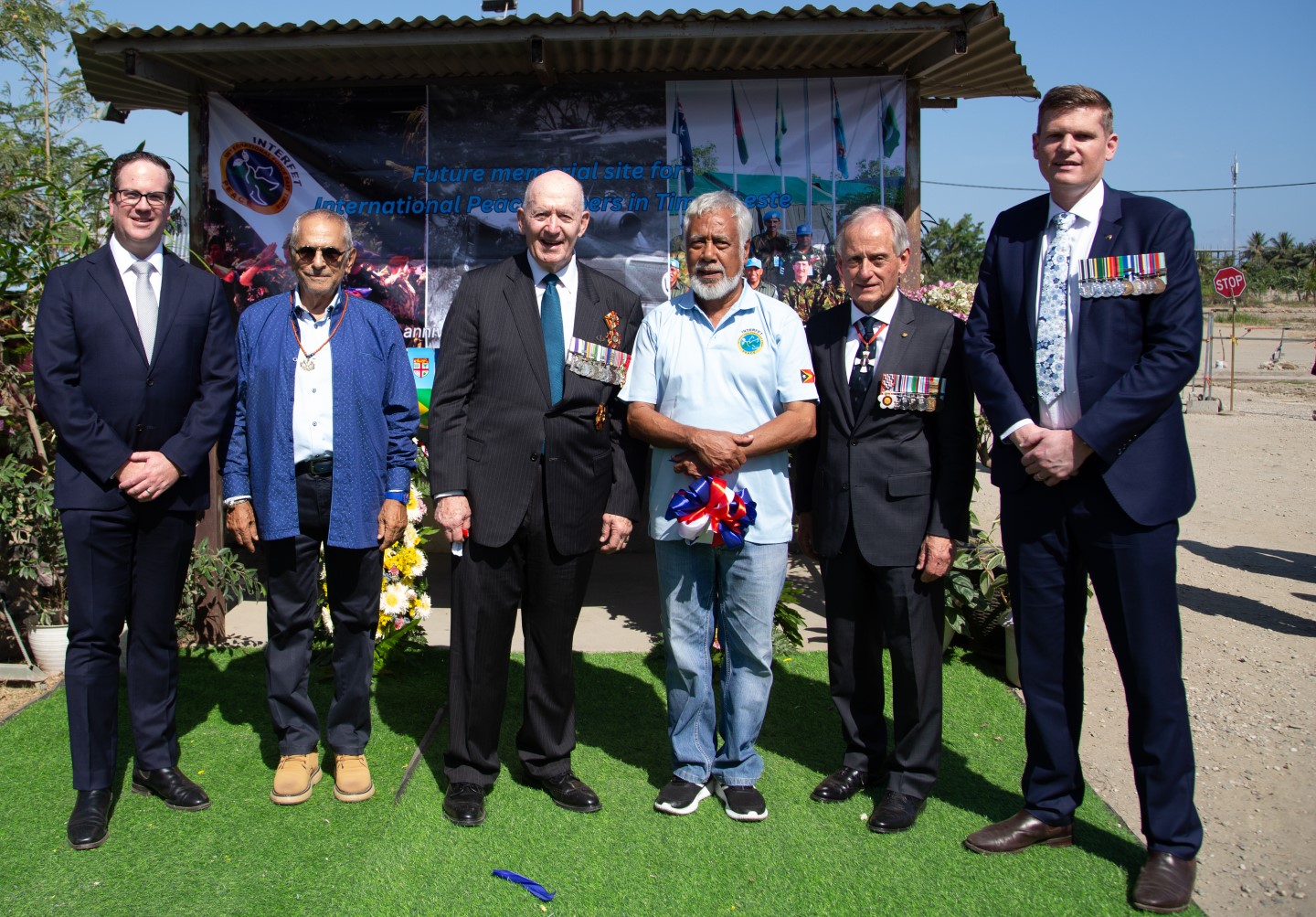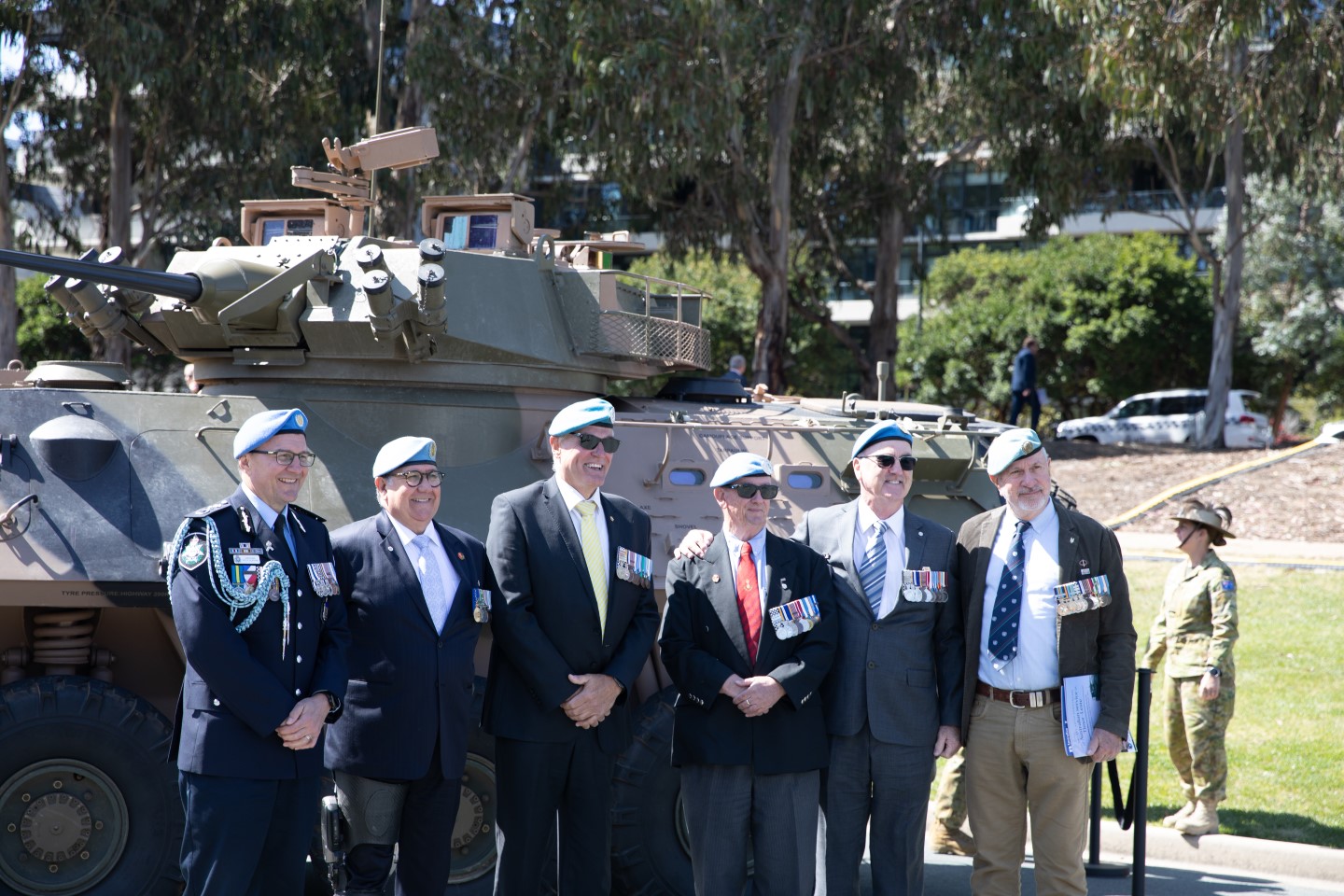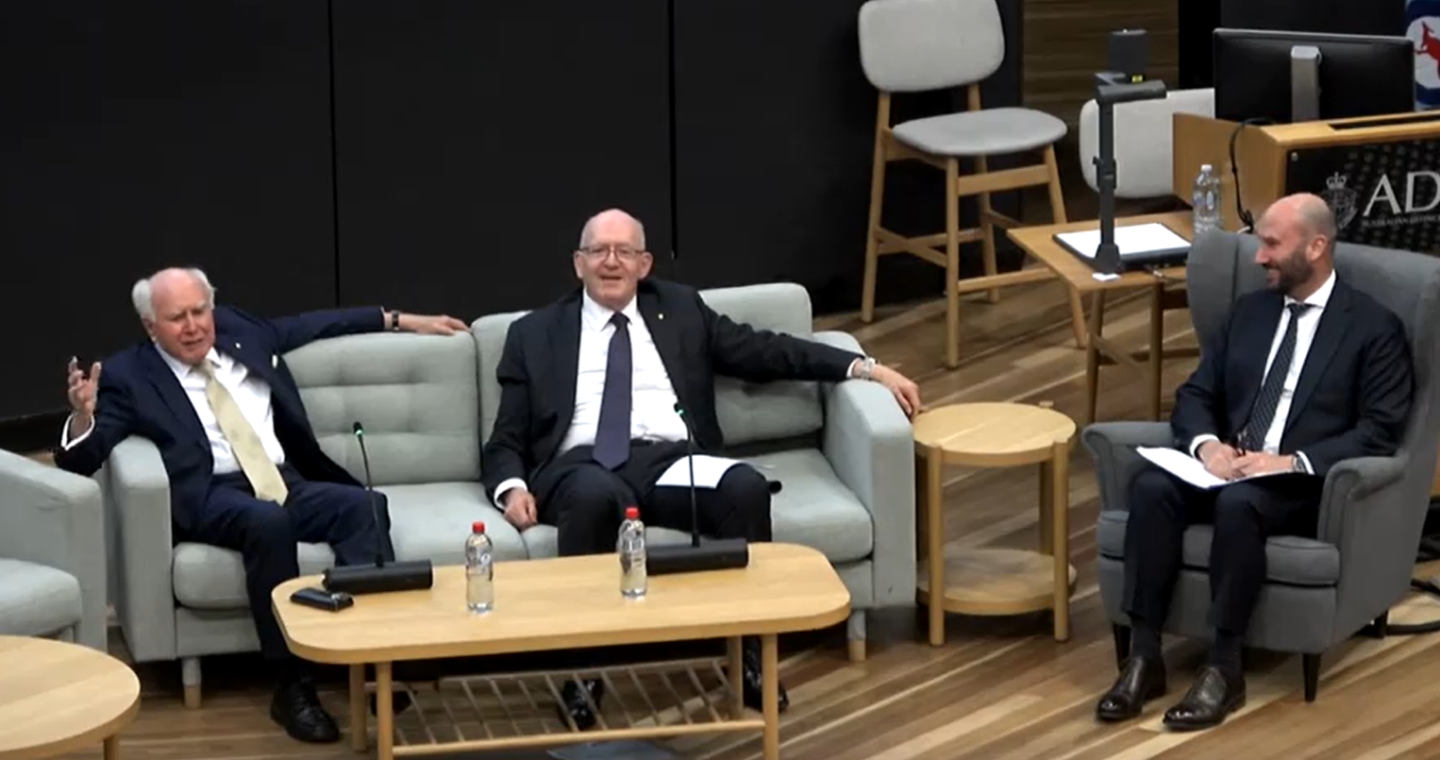Remembering Timor-Leste

25th Anniversary
In September, Australians reflected on 77 years of our nation’s involvement in peacekeeping operations and commemorated 25 years since the beginning of Australian service in Timor-Leste.
To honour the 25th anniversary, a National Commemorative Service was held at the Australian Peacekeeping Memorial in Canberra on 20 September.
The anniversary provided the opportunity to commemorate the service of all Australian men and women who served in Timor-Leste, and the sacrifice of their families. Tragically, 6 Australians lost their lives while deployed, or as a result of their service, in Timor-Leste.
The commemorative service was attended by more than 500 people, including dignitaries, and watched live on ABC television by another 135,000.
When arriving in East Timor it was difficult to see the destruction. Although the days were long, both physically and emotionally demanding, it was an honour to serve.
– Jody Hillier, Air Force veteran and INTERFET peacekeeper
Just a week earlier, we marked National Peacekeepers Day. Australia has contributed to more than 70 international peacekeeping operations in over 60 countries. Tens of thousands of Australian military personnel, police officers and civilians have served in peacekeeping roles. Sixteen Australians have lost their lives while serving on these operations.
While on an official visit to Timor-Leste, Minister for Veterans’ Affairs Matt Keogh said that when the Timorese people took the courageous step of voting for independence in 1999 and asked the international community for help to secure their nation, Australia answered.
‘Led by General Sir Peter Cosgrove from 1999–2000, the International Force East Timor (INTERFET) remains Australia’s largest peacekeeping mission to date, and at the time was our largest overseas military deployment since the Vietnam War,’ Minister Keogh said.
‘It was an honour to mark this significant milestone alongside General Cosgrove and a number of ADF veterans who returned to Timor-Leste, very fittingly on the 77th anniversary of Australian Peacekeeping.’
In the middle of the night, my platoon was attacked by the enemy, the fiercest attack on an Australian military outpost at the time. The smell of grenades and rounds of ammunition fired into the compound was still in the air.
– Mohammed Abdur Rahman, Army veteran and UNTAET peacekeeper

In June 1999, the United Nations Mission in East Timor was mandated to conduct a referendum to determine whether the East Timorese people would accept special autonomy within Indonesia, or whether they would vote for independence. On 30 August, 92.5 per cent of registered voters cast their ballots, resulting in a resounding defeat of the ‘special autonomy’ proposal.
Following the referendum, pro-integration groups (militias) began a campaign of violence and destruction across East Timor. On 14 September 1999, Indonesian President Dr B. J. Habibie formally requested a UN-mandated multinational force to deploy to East Timor and assist authorities in maintaining security.
Australia led the response with INTERFET to restore peace and security, and to protect and support the United Nations’ humanitarian assistance operations. Between 20 September 1999 and February 2000, Australia contributed more than 5,500 of the 10,000 troops from the 22 countries involved.
In Dili, Timor-Leste’s capital, Minister Keogh attended a commemorative ceremony where he laid a wreath on behalf of Australia at the future International Peacekeeper Memorial site, and renewed the commitment of friendship between Australia and Timor- Leste on behalf of the Australian Government.
It was an incredible sight to see so many Timorese people lined up along the dirt roads from 5 am, dressed in their Sunday finest going to pass their vote.
– Martin Hess, Australian Federal Police veteran and UNAMET peacekeeper
Speaking at the National Service, Minister Keogh said that Timor-Leste had made enormous progress since 1999.
‘For 25 years, East Timorese children have come of age in a peaceful and independent nation,’ he said. ‘Australia is proud to have played a part in that journey. We are thankful for the service and sacrifice of the Australian personnel who made it possible.’
The majority of Australian service in Timor-Leste spanned between 1999 and 2013 and encompassed ADF, Australian Federal Police personnel, and civilians. A number of Australians continued to serve after 2013, with ongoing efforts still in effect to this day.
Reflecting on Australian service in peace operations

The pathway to peace and solidarity: Australian service in peace operations seminar was held at the Australian Defence Force Academy to mark the 25th anniversary of Australian service in Timor- Leste. Facilitated by Repatriation Commissioner Khalil Fegan DSC AM, the full-day seminar featured a line-up of noteworthy speakers, including General the Honourable Sir Peter Cosgrove AK AC (Mil) CVO MC (Retd), Former Prime Minister, the Honourable John Howard OM AC, and Lieutenant General Peter Leahy AC (Retd).
The day provided a platform for ADF and Australian Federal Police personnel and other senior leaders to reflect on the experiences they had during peacekeeping operations in East Timor, now Timor-Leste.
Opening the proceedings, Commissioner Fegan, who served in East Timor, said that it was a fundamentally impactful experience. ‘For most of the young men and women from an array of nations and organisations who deployed, this would be their first experience of peacekeeping. Personally, this experience was an awakening,’ he said.
The highlight of the event was a conversation between Sir Peter Cosgrove and former Prime Minister John Howard, who reflected on their pivotal leadership roles during this crisis.
‘As Prime Minister, I encountered a remarkable group of men and women at the ADF leadership level,’ Mr Howard said. ‘It’s always been by my judgment that what was crucial to the success of the intervention was the remarkably low level of casualties.’
Sir Peter, who commanded INTERFET, compared the mission to handling a large, quite vigorous dog: ‘You had to hang onto the collar hard from time to time,’ he said. ‘I was so thrilled when we got a Chapter 7 [United Nations] mandate, which basically said “You have the ability prosecute anybody who is not obeying the mandate – disarming, being obedient, and doing as you tell them – and the more we had that, the less violence we had to use”.’
The key themes of the seminar included veterans sharing their experiences during their deployment, as well as discussions around the ongoing connections and relationships established and strengthened with our allies during the operation. Participants also delved into the important relationship between the ADF and Australian Federal Police, and how they worked together to achieve their common goal in Timor-Leste.
To watch the seminar recording, visit the DVA website.
Tales of Timor
Tales of Timor is a series of stories encompassing personal experiences and reflections of veterans who were in Timor-Leste and offers readers the chance to learn more about our peacekeeping efforts to help with the humanitarian and security crisis that took place.
The series includes interviews with veterans of various ranks, images of them undertaking their peacekeeping duties, and photos showing how Australian troops filled their rooms with memories from home. You can read the Tales of Timor stories on the DVA website.
Images:
L to R: Minister Matt Keogh; President of Timor-Leste José Ramos-Horta;
General the Honourable Sir Peter Cosgrove AK CVO MC (Retd); Prime Minister
of Timor-Leste Kay Rala Xanana Gusmão; Major General Martyn Dunne
(Retd, New Zealand), and Mr Tim Costley, Member for Ōtaki and veteran of
the New Zealand Air Force, at a commemoration of the 25th Anniversary of the
International Force INTERFET in Dili, Timor-Leste. (Image: Defence)
Veteran peacekeepers at the National Commemorative Service in Canberra
Former Prime Minister John Howard, Sir Peter Cosgrove and Repatriation Commissioner Kahlil Fegan.
